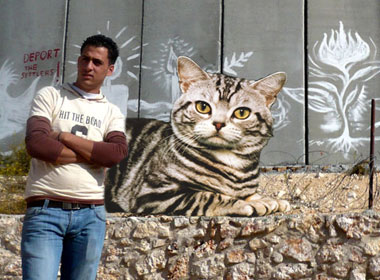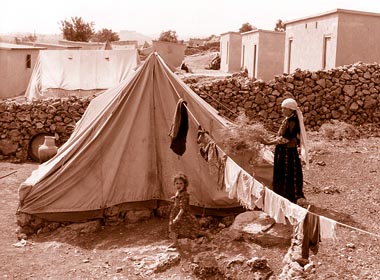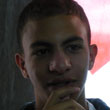
18-year old Mohamad Waleed, aka Mousa, wanted to produce a story about the controversial Israeli Separation Wall, which is hardly surprising given it surrounds two sides of Aida Refugee Camp in which he lives. What is surprising however, is the way he decided to present his story; electing to write a play about a cavalier cat that likes to walk…
Although written in English for an English speaking audience, it uses a number of colloquial Arabic words and phrases. So, as an added bonus, you’ll get to learn a little of the language spoken on the street in Palestine!
(Mousa also designed and photoshopped the image at the top of this post.)
NARRATOR: Once upon a time there was a cat called Mousa. He was a black and white coloured cat with scruffy hair. Mousa the cat liked to walk. One day, he walked down the street and bumped into Fareed- a kitten, who was sitting down in the gutter looking sad.
MOUSA: Hey Fareed, what’s happening?
FAREED: I want to play football. But, there’s no where to play here in the camp since they built the wall…And I don’t get to see my friends now.
MOUSA: Where did you play before?
FAREED: We played in the field over there. The only place to play now is on the street and my parents won’t let me because they think it’s too dangerous with all the cars.
MOUSA: Hey Fareed, don’t be sad. Every time life gets me down, I go for a walk.
(clicks fingers)
MOUSA: Walk with me.
(sound of tabla)
NARRATOR: The cats walk off together and walk past the mosque. They notice Fatima, an old lady cat struggling with her groceries.
(sound of walking and rustling shopping bags)
FATIMA: Ye sitt-tee my son, can you please help me carry the fruit and vegetables.
MOUSA: Mashi, sitt-ee. Grandmother, I am happy to help you.
(sound of shopping bags exchanging hands)
NARRATOR: On the walk to her house, Mousa notices that Fatima looks sad.
MOUSA: Sitt-ee, why are you sad?
FATIMA: W’alla el mote arr hum ye-sitt-tee. Every Friday I used to go to al-Aqsa Mosque. I am now 87 and would love to see it again (coughs) before I die. But because of the wall, (coughs) I can’t go anywhere near it.
FAREED: W’alla ye-sitt-tee, I miss the Kayk Jerusalem.
MOUSA: Ye-sitt-tee, every time life gets me down, I go for a walk. Come for a walk with us!
FATIMA: Ye-sitt-tee I am very tired, (coughs) I just want to stay in my home.
MOUSA: Marshi Sitt-tee. It’s OK. We will go now. Salaam!
FAREED: Salaam sittee
FATIMA: Ma’salaamah. Shokran. Goodbye and thank you.
(sound of tabla)
NARRATOR: Mousa and Fareed continue on their walk.
FAREED: Mousa, I’m hungry meow, meow.
MOUSA: OK. Let’s go to eat felafel. Yalla!
NARRATOR: The two cats walk to their favourite felafel shop in Bethlehem. Only to find Saleh, the owner, has already closed.
(sound of theme music)
MOUSA: Al-arf-yeh
SALEH: Allo Mousa, a Zedaq-afee
MOUSA: Why is the shop not open? It’s only early!
SALEH: Because…there’s no point anymore. I have to close. I can not afford to keep going. Actually, since The Wall was built, I’m just not getting the same level of business. No tourists come here anymore, they all stay in Jerusalem…and I have a big family to support, so it’s time – I think – to search for new work.
MOUSA: Every time life gets me down, I go for a walk. Come for a walk with us!
FAREED: But, I’m very hungry…Where can I go to eat?
MOUSA: Khallas, it’s OK. Come Fareed! Come to my home to eat. Let’s walk!
(sound of tabla)
NARRATOR: The pair walk to Mousa The Cat’s house. When they get there, Sara – Mousa’s sister, is sitting on the computer.
MOUSA: Marhabba!
SARA: Ahlain. Oh Fareed habibi, how are you?
MOUSA: Fareed today…is not good. But now I think he’s better.
SARA: Meow…Laish?
FAREED: Because I can’t see my friend anymore, he lives in Jerusalem. And now because of the wall, I can’t go and play with him, meow.
SARA: W’alla! Like me. My best friend, who used to study with me at my school lives on the other side of the wall. Meow. Now I can only chat to her on MSN Messenger and the phone. Don’t be sad Fareed. It’s normal. It’s life. You can always play with Mousa.
MOUSA: Sara Khallas. I didn’t bring Fareed here to be sad. We’re here to eat.
SARA: OK, our mother made Maqlouba, I will bring some for you.
(sound of theme music)
NARRATOR: Mousa and Fareed eat together and decide after the day they have shared to become friends.
That night, Fareed had a dream. He dreamt that the wall fell down and he was able to play football in the field next to the camp and to visit his friend.
Over the next few days, weeks and months, the pair were seen together on many a long walk.
THE END
The cast in order of appearance:
| Narrator | Rowayed Nidal | |
| Mousa | Mohamad Waleed | |
| Fareed | Mohamad Waleed | |
| Fatima | Linda Al Azzeh | |
| Saleh | Nidal Al Azza | |
| Sara | Amal Abu Srour |
Glossary of Arabic words and phrases used in this radio play:
| Ye sittee | A term of endearment used between the old and the young | |
| Mashi | Sure, will do | |
| W’alla el mote arr hum | I swear to God, this life is worse than death | |
| Kayk Jerusalem | A delicious Palestinian sweet | |
| Salaam | Literally means peace but used daily as a ‘hi’ and ‘bye’ greeting | |
| Y’alla | Lets’ go / move | |
| Al arf yeh | To your health | |
| A Zedaq Afee | Good health to you too | |
| Khallas | Enough / Finish / Finished | |
| Marhabba | Hello | |
| Ahlain | Welcome | |
| Habibi | Sweetie / darling | |
| Laish | Why | |
| W’alla | I swear to God | |
| Maqlouba | A popular Palestinian dish made with chicken, rice and vegetables |

 Like all teenagers, 14 year old Saja Ajarma, is concerned about how other people perceive her. Specifically the western world…She wants people to understand that she, like all of her friends, are normal kids – with the same past times, dreams and interests, as other youth living outside of the West Bank. That is why she prepared this story about a particularly average day in her life.
Like all teenagers, 14 year old Saja Ajarma, is concerned about how other people perceive her. Specifically the western world…She wants people to understand that she, like all of her friends, are normal kids – with the same past times, dreams and interests, as other youth living outside of the West Bank. That is why she prepared this story about a particularly average day in her life.
 Ahlan wa sahlan! Welcome to the first Radio Lajee program. For our first edition, 14 year old Miras Al Azzeh has prepared a special story about the traditional Palestinian dance,
Ahlan wa sahlan! Welcome to the first Radio Lajee program. For our first edition, 14 year old Miras Al Azzeh has prepared a special story about the traditional Palestinian dance,